July 22, 2024
By Alison Bowen
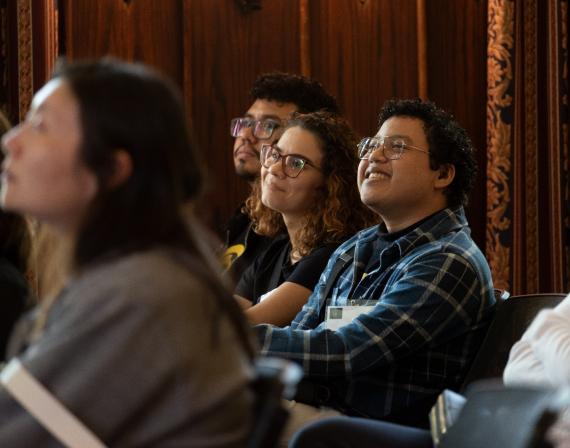 Mind Bytes attendees listening to talks. Photo by Alan Klehr.
Mind Bytes attendees listening to talks. Photo by Alan Klehr.
Universities are brimming with ideas, but bringing those along a path to a well-researched result can be challenging.
This year’s Mind Bytes research computing expo and symposium, centered on the theme "From Ideas to Results: Powering Research and Discovery with Computation and Data.”
Faculty, staff, and students at the University of Chicago gathered on April 30 for the Research Computing Center’s (RCC) annual conference, which highlighted how high-end computing and data can advance research and ideas. Students and faculty showcased their research and the various and innovative ways RCC enables their work. Faculty speakers discussed a variety of topics that leverage the computing center’s resources and programs, ranging from accessibility to artificial intelligence to how monkeys chew and what that reveals about brains.
With thousands of users and hundreds of faculty members, the RCC is a crucial campus resource that supports faculty and students in their research.
 Hakizumwami Birali Runesha, Director of the RCC and Associate Vice President for Research Computing. Photo by Alan Klehr.
Hakizumwami Birali Runesha, Director of the RCC and Associate Vice President for Research Computing. Photo by Alan Klehr.
“Today, more than ever, the research process and innovation hinges on access to computational and data resources,” said Hakizumwami Birali Runesha, Director of the RCC and Associate Vice President for Research Computing.
The event featured a wide range of activities, including the annual poster competition and resource fair where students discovered how university resources can transform and support their projects. Students networked, meeting people in different disciplines working on similar projects.
 Erin J. Adams, Vice Provost for Research at the University of Chicago and the Joseph Regenstein Professor in the Department of Biochemistry and Molecular Biology. Photo by Alan Klehr.
Erin J. Adams, Vice Provost for Research at the University of Chicago and the Joseph Regenstein Professor in the Department of Biochemistry and Molecular Biology. Photo by Alan Klehr.
“This is an incredibly exciting time to participate in this event and learning more about the groundbreaking research conducted at the University. There has been an explosion of innovation, including AI and Quantum, which furthers research in ways previously not thought possible. Researchers from all fields are leveraging new tools and computational methods which further enables them to make a difference at home and globally,” said Erin J. Adams, Vice Provost for Research at the University of Chicago and the Joseph Regenstein Professor in the Department of Biochemistry and Molecular Biology.
Fast-paced research summaries
Aiming to distill research in just a few minutes, university faculty explained data in the “Lightning Talks,” fast-paced research summaries.
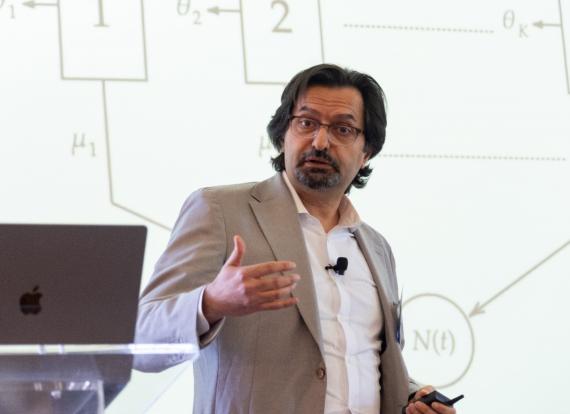 Baris Ata, business professor at the Booth School, where he is the Sigmund E. Edelstone Distinguished Service Professor of Operations Management. Photo by Alan Klehr.
Baris Ata, business professor at the Booth School, where he is the Sigmund E. Edelstone Distinguished Service Professor of Operations Management. Photo by Alan Klehr.
Baris Ata, business professor at the Booth School, where he is the Sigmund E. Edelstone Distinguished Service Professor of Operations Management, spoke about artificial intelligence and operations management. He noted this includes how companies like Amazon and airlines continually assess prices, inventory, and customer service. He explained how their research analyzed a national call center’s scheduling issue. A systems manager decided which servers go to what customer call; customers may get frustrated and abandon the effort to call in, which can result in frustration as well as costs. Researchers used technology to solve problems through a computational method that could be feasible for call centers with 100 or more customer classes.
 Nicholas G. Hatsopoulos, professor of neuroscience as well as organismal biology and anatomy. Photo by Alan Klehr.
Nicholas G. Hatsopoulos, professor of neuroscience as well as organismal biology and anatomy. Photo by Alan Klehr.
Nicholas G. Hatsopoulos, professor of neuroscience as well as organismal biology and anatomy, discussed research on animal behavior and the brain. Hatsopoulos looked closely at how monkeys chew, for example, decoding tongue movements and shape. Showing an x-ray of a monkey chewing, Hatsopoulos noted the sequence inside the tongue, where food arrived, and how molars chewed in a rhythmic behavior. “You can see a whole sequence of complex behavior,” he said. Their decoding results showed the length, width, and protrusion of the tongue. With this kind of research, researchers can better understand how areas of the brain process information during natural behaviors like finding prey, eating, and sleeping.
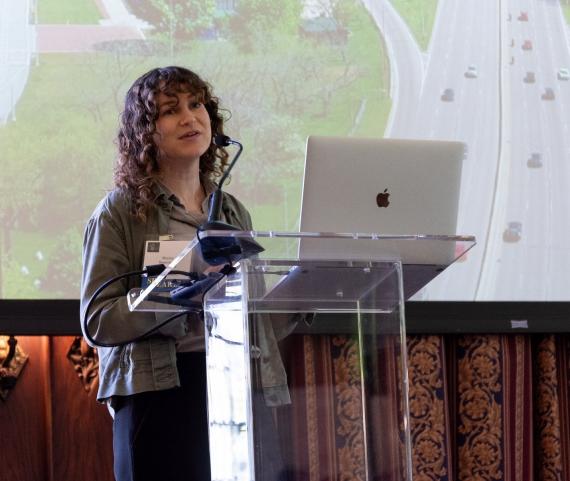 Monica Rosenberg, an assistant professor in the Department of Psychology. Photo by Alan Klehr.
Monica Rosenberg, an assistant professor in the Department of Psychology. Photo by Alan Klehr.
Why do minds wander, and what can it tell us about our brains and behavior? This is a question studied by Monica Rosenberg, an assistant professor in the Department of Psychology and whose labs studies mind wandering. “A lot of the time,” Rosenberg said, “we’re actually thinking about something that is different than the task at hand.”
She discussed how brain networks can be measured with functional magnetic resonance imaging (MRI) and how that can help understand wandering thoughts. In their research, people were placed in an MRI machine with 30 seconds of rest and then 10 seconds to speak about what they were thinking about. The 60 participants answered questions including how awake they felt and whether they were thinking about the future or the past, themselves or other people. Such research results can potentially be predictive of factors like sustained attention, working memory, and even creativity. A large data set stored on the RCC servers supported their research, Rosenberg said.
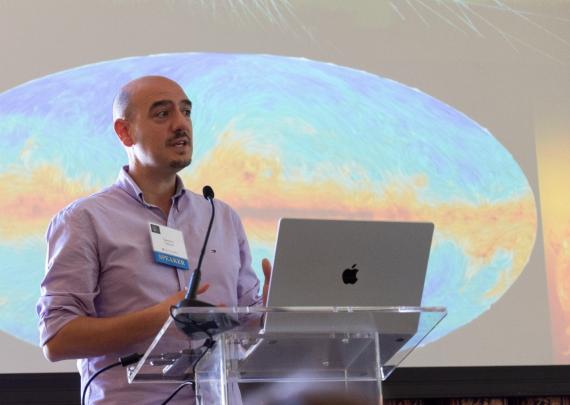 Damiano Caprioli, an associate professor in the Department of Astronomy and Astrophysics and in the Enrico Fermi Institute. Photo by Alan Klehr.
Damiano Caprioli, an associate professor in the Department of Astronomy and Astrophysics and in the Enrico Fermi Institute. Photo by Alan Klehr.
Damiano Caprioli, an associate professor in the Department of Astronomy and Astrophysics and in the Enrico Fermi Institute, told the audience about cosmic rays.
Caprioli discussed how these extraterrestrial energetic particles can be studied with newer telescopes and supercomputer simulations. Being able to research cosmic rays matters to everyone, he said, because space weather can immensely impact those of us on Earth. In 1989, for example, during what’s known as the Carrington event, a geomagnetic storm impacted the telegraph system. If such an event happened now, he said, it could create an enormous disruption to the electrical grid. By better understanding these issues, we could potentially predict such events and turn off the electric grid in advance.
“It’s not inconceivable to think there could be millions of people left without electricity for months,” he said.
The current state of access to artificial intelligence
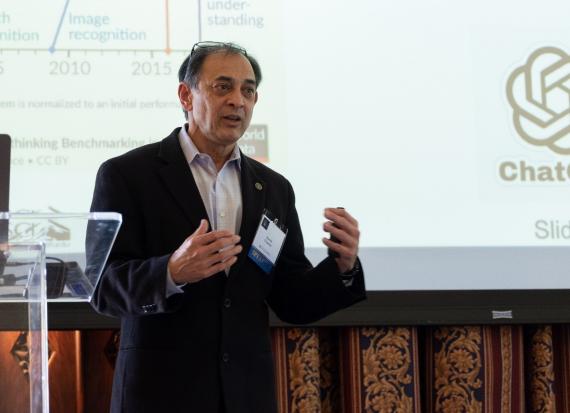 Manish Parashar, director of the Scientific Computing and Imaging Institute and Presidential Professor in the University of Utah's Kahlert School of Computing. Photo by Alan Klehr.
Manish Parashar, director of the Scientific Computing and Imaging Institute and Presidential Professor in the University of Utah's Kahlert School of Computing. Photo by Alan Klehr.
Within the keynote address, “Democratization of Responsible Artificial Intelligence,” Manish Parashar, director of the Scientific Computing and Imaging Institute and Presidential Professor in the University of Utah's Kahlert School of Computing, spoke about how AI can be a useful tool but also one with potentially negative consequences. He discussed barriers to democratize access to artificial intelligence.
Some of those include a simple but vital one: the public’s basic awareness – understanding why AI is important and relevant on an individual basis. Ability and access are also issues; getting the skills to use AI and finding help if needed. Many people do not understand artificial intelligence and how it could benefit or impact them. Others simply do not have access to these tools, much less access to a resource to help them utilize those tools in the best way.
“There are a lot of barriers to getting access to the infrastructure,” he said.
Ensuring guardrails around artificial intelligence is also key, Parashar said. People should be thinking through factors such as what technology could be used for in the future. He noted that in 2022, the White House’s Office of Science and Technology Policy issued a memo to provide free, immediate, and equitable access to research that is federally funded. and a zero-embargo of peer-reviewed articles. The White House memo required federal agencies to complete and publish fully policy development for plans implementing provisions of their public access policies by 2025.
The AI National Artificial Intelligence Research Resource (NAIRR) initiative launched by the National Science Foundation (NSF) in response to the growing need for equitable access to AI research tools and resources for researchers in academia and small businesse. In 2024, Utah created the Artificial Intelligence Policy Act, which establishes liability for use of AI that violates consumer protection laws if not properly disclosed, Parashar said. It also requires disclosure when an individual interacts with AI in a regulated occupation, such as a bot.
Parashar spoke about how federal agencies and other collaborators are trying to balance innovation and security and efforts toward ensuring responsible and effective usage of AI.
“Everybody should be able to share the data,” he said. “Everybody should be able to benefit from the shared data.”
Fireside chat about climate change and research limitations
A key research focus in coming years will center around climate change. This topic was discussed by two professors during the fireside chat titled “Exploring the Nexus of Climate Research: Innovations, Challenges, and Future Directions.”
 Pedram Hassanzadeh, an associate professor in the Department of the Geophysical Sciences and member of the Committee on Computational and Applied Mathematics, giving a portion of the fireside chat while Hakizumwami Birali Runesha, Director of the RCC and Associate Vice President for Research Computing and Amir Jina, assistant professor in the Harris School of Public Policy and a senior fellow at the Energy Policy Institute of Chicago listen. Photo by Alan Klehr.
Pedram Hassanzadeh, an associate professor in the Department of the Geophysical Sciences and member of the Committee on Computational and Applied Mathematics, giving a portion of the fireside chat while Hakizumwami Birali Runesha, Director of the RCC and Associate Vice President for Research Computing and Amir Jina, assistant professor in the Harris School of Public Policy and a senior fellow at the Energy Policy Institute of Chicago listen. Photo by Alan Klehr.
Climate research presents challenges that artificial intelligence may be able to help, said Amir Jina, assistant professor in the Harris School of Public Policy and a senior fellow at the Energy Policy Institute of Chicago. He explained that challenges of climate damage assessments include not always having a two-way exchange between physical and social scientists, which would help improve data models. “We have often been passive recipients” of data, he said. Also, datasets from satellites can be challenging in their complexity. Reducing the complexity of large datasets, for example, could lead to new discoveries.
Climate research requires quantifying complex interactions among highly complex systems, said Pedram Hassanzadeh, an associate professor in the Department of the Geophysical Sciences and member of the Committee on Computational and Applied Mathematics. A major challenge is that traditional models and data can lead to high uncertainty.
Artificial intelligence could help by creating faster models. Right now, climate research can be expensive; harnessing AI in the right way could open new paths for research.
Jina said as far as informing people about climate change, it could help to democratize access to data. For example, providing a person with data about how their own town might transform because of climate change – down to the detail of certain degrees or loss – could help people take the issue personally and seriously. This could improve storytelling and provide an emotional connection for people.
Being able to say something with that specificity, Jina said, can be very powerful.
Mind Bytes 2024 Poster Awards
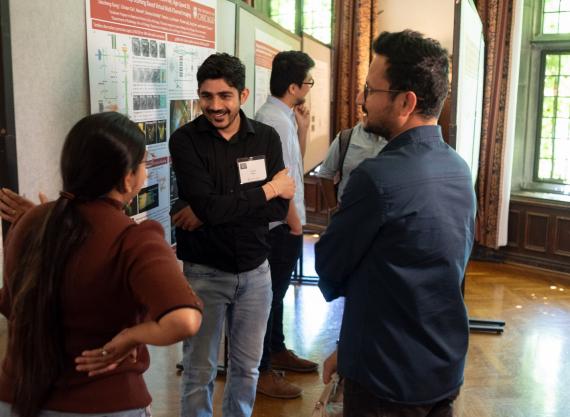 Poster session at Mind Bytes. Photo by Alan Klehr.
Poster session at Mind Bytes. Photo by Alan Klehr.
Each year, a highlight of the event, is the research posters. Researchers present posters reflecting the various ways the RCC’s high-end computing resources are used in support of their work. Awards are given for the top poster in 4 categories: Data Science, Computing, Data Visualization, and Judges Choice. This year’s winners were:
- Computing Category: Peiyuan Ma: “Fluorination promotes lithium salt dissolution in borate esters for lithium metal batteries”
- Visualization Category: Gabriel Casella: “Renal cell classification in highly multiplexed microscopy imaging using a biology-based decision tree classifier”
- Data Science: Logan Cabral-Pelletier: “3D Cloud Permitting Models of Habitable Exoplanets”
- Judges Choice: Silva Desetty: “Simplifying PFAS detection in water with molecular probes designed using machine learning”